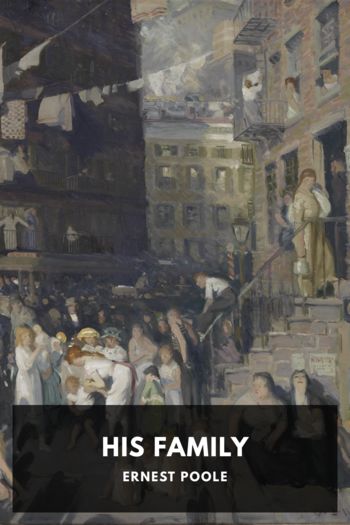His Family - Ernest Poole (ereader for comics .txt) 📗

- Author: Ernest Poole
Book online «His Family - Ernest Poole (ereader for comics .txt) 📗». Author Ernest Poole
And though he saw little of Deborah, slowly, almost unawares to them both, she assumed the old place she had had in his home—as the one who had been right here in the house through all the years since her mother had died, the one who had helped and never asked help, keeping her own troubles to herself. He fell back into his habit of going before dinner to his daughter’s bedroom door to ask whether she would be home that night. At one such time, getting no response and thinking Deborah was not there, he opened the door part way to make sure. And he saw her at her dresser, staring at herself in the glass, rigid as though in a trance. Later in the dining room he heard her step upon the stairs. She came in quietly and sat down; and as soon as dinner was over, she said her good nights and left the house. But when she came home at midnight, he was waiting up for her. He had foraged in the kitchen, and on his study table he had set out some supper. While she sat there eating, her father watched her from his chair.
“Things going badly in school?” he inquired.
“Yes,” she replied. There was silence.
“What’s wrong?”
“Tonight we had a line of mothers reaching out into the street. They had come for food and coal—but we had to send most of them home empty-handed. Some of them cried—and one of them fainted. She’s to have a baby soon.”
“Can’t you get any money uptown?” he asked.
“I have,” she answered grimly. “I’ve been a beggar—heaven knows—on every friend I can think of. And I’ve kept a press agent hard at work trying to make the public see that Belgium is right here in New York.” She stopped and went on with her supper. “But it’s a bad time for work like mine,” she continued presently. “If we’re to keep it going we must above all keep it cheap. That’s the keynote these days, keep everything cheap—at any cost—so that men can expensively kill one another.” Her voice had a bitter ring to it. “You try to talk peace and they bowl you over, with facts on the need of preparedness—for the defence of your country. And that doesn’t appeal to me very much. I want a bigger preparedness—for the defence of the whole world—for democracy, and human rights, no matter who the people are! I’d like to train every child to that!”
“What do you mean?” her father asked.
“To teach him what his life can be!” she replied in a hard quivering tone. “A fight? Oh yes! So long as he lives—and even with guns if it must be so! But a fight for all the people on earth!—and a world so full of happy lives that men will think hard—before ever again letting themselves be led by the nose—into war and death—for a place in the sun!” She rose from her chair, with a weary smile: “Here I am making a speech again. I’ve made so many lately it’s become a habit. I’m tired out, dad, I’m going to bed.” Her father looked at her anxiously.
“You’re seeing things out of proportion,” he said. “You’ve worked so hard you’re getting stale. You ought to get out of it for a while.”
“I can’t!” she answered sharply. “You don’t know—you don’t even guess—how it takes every hour—all the demands!”
“Where’s Allan these days?”
“Working,” was her harsh reply. “Trying to keep his hospital going with half its staff. The woman who was backing him is giving her money to Belgium instead.”
“Do you see much of him?”
“Every day. Let’s drop it. Shall we?”
“All right, my dear—”
And they said good night …
In the meantime, in the house, Edith had tried to scrimp and save, but it was very difficult. Her children had so many needs, they were all growing up so fast. Each month brought fresh demands on her purse, and the fund from the sale of her belongings had been used up long ago. Her sole resource was the modest allowance her father gave her for running the house, and she had not asked him for more. She had put off trouble from month to month. But one evening early in March, when he gave her the regular monthly check, she said hesitatingly:
“I’m very sorry, father dear, but I’m afraid we’ll need more money this month.” He glanced up from his paper:
“What’s the matter?” She gave him a forced little smile, and her father noticed the gray in her hair.
“Oh, nothing in particular. Goodness knows I’ve tried to keep down expenses, but—well, we’re a pretty large household, you know—”
“Yes,” said Roger kindly, “I know. Are the month’s bills in?”
“Yes.”
“Let me see them.” She brought him the bills and he looked relieved. “Not so many,” he ventured.
“No, but they’re large.”
“Why, look here, Edith,” he said abruptly, “these are bills for two months—some for three, even four!”
“I know—that’s just the trouble. I couldn’t meet them at the time.”
“Why didn’t you tell me?”
“Laura was here—and I didn’t want to bother you—you had enough on your mind as it was. I’ve done the best I could, father dear—I’ve sold everything, you know—but I’ve about come to the end of my rope.” And her manner said clearly, “I’ve done my part. I’m only a woman. I’ll have to leave the rest to you.”
“I see—I see.” And Roger knitted his heavy brows. “I presume I can get it somehow.” This would play the very devil with things!
“Father.” Edith’s voice was low. “Why don’t you let Deborah help you? She does very little, it seems to me—compared to the size of her salary.”
“She can’t do any more than she’s doing now,” was his decisive answer. Edith looked at him, her color high. She hesitated, then burst out:
“I saw her check book the other day, she had left it on the table! She’s spending thousands—every month!”
“That’s not her own money,” Roger said.
“No—it’s money she gets for her fads—her work for





Comments (0)